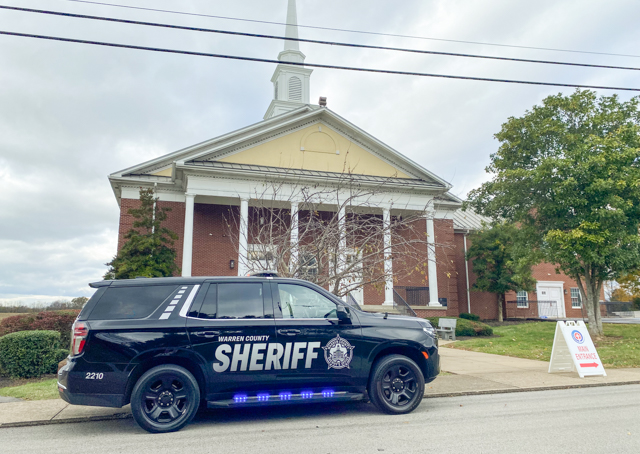Program denotes communication needs in driver-police stops
Published 6:00 am Saturday, November 2, 2024

- Oakland Elementary students, teachers and faculty were evacuated from the school and relocated to Oakland Baptist Church for medical treatment after numerous people claimed to feel unwell due to an HVAC unit on the roof blowing exhaust fumes inside the building on Thursday, Nov. 21, 2024. Warren County Sheriff’s Office was assisted on scene by Smiths Grove Police, Med Center Health EMS, Bowling Green Fire and other first responders. GRACE MCDOWELL / DAILY NEWS
By DAVID MAMARIL HOROWITZ
david.horowitz@bgdailynews.com
Drivers concerned about effective communication with law enforcement due to a disability or health condition can apply for a Kentucky program alerting officers about it when they approach vehicles.
Trending
Applicants of this Communication Designation program can get a code for their vehicle registration that informs officers of a communication difference. Warren County Clerk Lynette Yates said applicants should apply in person with identification.
The program was previously limited to drivers deaf or hard of hearing; a state law effective January 2024 expanded it. Matt Cole, Kentucky’s commissioner for its Department of Vehicle Regulation, confirmed drivers can apply out of concern for a passenger with a communication difference.
Though the program typically designates drivers, “if somebody felt like there was an extreme enough condition that it would be constant and maybe alarming to somebody that wasn’t familiar with it, then we would encourage them to do it as well,” Cole said when asked if the program accounts for passengers.
Laila Lee Randolph, sometimes a driver for her autistic 8-year-old brother, expressed appreciation. Randolph said that while her brother sometimes repeats comforting family phrases to soothe himself, at other times, he might unintentionally raise his voice or experience anxiety attacks or panic attacks in stressful or unexpected situations. Their being Black, she said, adds to anxiety during police interactions.
“(This program’s) going to help out a lot more than people realize specifically for autistic people of color,” she said.
Drivers don’t need to provide proof to apply, Cole said. He added, “We can’t think of any situation where somebody who doesn’t have (a condition) would come in and want it … It doesn’t give them a get-out-of-jail-free card or anything.”
Trending
County clerks can register someone as “deaf or hard of hearing” – and the update is supposed to add “or communicative barrier” to that category, according to the Kentucky Transportation Cabinet. However, the commonwealth’s new vehicle registration system, which has had many issues, doesn’t yet include it.
Cole said in an Oct. 25 interview that he expected this to be updated within a couple weeks. Until then, he said, clerks can mark applicants who experience a “communicative barrier” as deaf or hard of hearing; Yates said she received this direction that same day, and in such cases, her office will add a notation about a person’s disability or condition.
This incorrect categorization effectively doesn’t matter, according to Cole: The program solely alerts law enforcement that someone has a condition or disability that affects communication without revealing details, he said.
Increasing awareness, effectiveness
In Warren County, this workaround hasn’t caused confusion – Yates said Monday no one has asked to apply for expectedly soon-to-be-updated category.
Organizations across the region and state this past month have shared a flyer about it on Facebook; these include the Bowling Green Police Department, the nonprofit Lifeskills, the KY Office for Children with Special Health Care Needs and the Kentucky Autism Training Center, the organization that made the flyer.
“I think that having the option for a person with any communication difference to share that information is an excellent step in the right direction,” said Heidi Cooley-Cook, the latter’s assistant director.
Cole, the commissioner, said that if people have ideas to improve the program, “we will certainly be willing to listen to that,” and people can contact him to set up a meeting.
A key way to enhance its effectiveness would be enabling people to volunteer additional details about ways they communicate, said Cooley-Cook and Christina Noel, interim director of Western Kentucky University’s Suzanne Vitale Clinical Education Complex.
Even if officers could see a person’s diagnosis, Noel said that knowing a person has autism is just one small piece of information when considering if they have communication differences. For instance, a person could be nonspeaking and use a device to communicate, have no communication difference or primarily have an impairment that affects their language socially, she said.
“This program will be most successful if it allows individuals to outline specifically what type of communication need they may have, because the police would approach each situation extremely differently,” Noel said.
If that becomes possible, it would be additionally helpful to have examples of what types of information people should report about their communication needs, she said. To this point, “some level of shared language would be so valuable,” she said.
Shea Ryan-Kessler, an autistic fourth-year psychology major at WKU, separately reaffirmed Noel’s point about letting people share details.
While the program simply indicates there may be a communication difference for police officers, “having someone who has a speech issue is a little different than having someone who’s autistic because it’s not just having a speech issue – it is processing,” Ryan-Kessler said. “When I’m frustrated or confused or stressed, it often represents itself as me being angry when I’m not actually angry – I’m just trying to process things … and I don’t always recognize that I’m coming across that way.”
Jak Perdew, an autistic WKU freshman, reflected on his experiences during stressful situations.
“Any reasoning just goes right out the door – immediately goes to the worst thing possible, hyperventilating, freaking out, I can’t breathe, so many things are going on at once inside my head, I can’t concentrate; it’s very overstimulating,” he said. “I know if I was pulled over, I wouldn’t know what to say, I wouldn’t really know how to act, and I just think (this program) would be really beneficial.”
Noel added that she thinks police officers should have training on responding to different communication needs.
“The training may not need to be extensive, but again, the need for shared language between law enforcement and the autism community would be key to this program working,” she said.
Training, Cooley-Cook said, can help officers improve communication and understand common characteristics of autism to account for behaviors that might otherwise come off as disrespectful, such as not paying attention, lacking eye contact, or taking additional seconds to answer a question.
“If an officer knows that a person has a communication disorder, and if (the vehicle registration code) did … say they’re autistic, having that information would hopefully encourage them to slow down, to utilize more patience in the interaction and to have an understanding of the characteristics of autism,” she said.
Ryan-Kessler emphasized that it’s essential to incorporate correct information in such training – holistic and nuanced, rather than reductive or solely deficit-focused.
“I feel like a lot of people have misperceptions about people on the spectrum, and there’s a lot of misinformation out there,” she said. “People say that we don’t have empathy, but we do. It’s very strong. Just because we can’t read situations very well, it doesn’t mean we don’t feel things the way we’re supposed to; we just don’t always react the way we’re expected to.”
Most law enforcement agencies can access a language line, Warren County Sheriff Brett Hightower said; BGPD Public Information Officer Ronnie Ward said police can communicate with deaf residents via an interpreter digitally. Hightower added that law enforcement have generalized training that may cover interactions with people who have communication issues, and the state’s Crisis Intervention Training is for people going through mental health crises or episodes.
Neither BGPD nor the Warren County Sheriff’s Office has training specific to the communication differences newly covered by the program, Ward and Hightower confirmed about their respective agencies.
Communication cards at shorturl.at/J59Q3 can be printed and placed within car visors to inform officers about communication differences. A version for autistic people is available via a link on the website above or at shorturl.at/Onz3w





